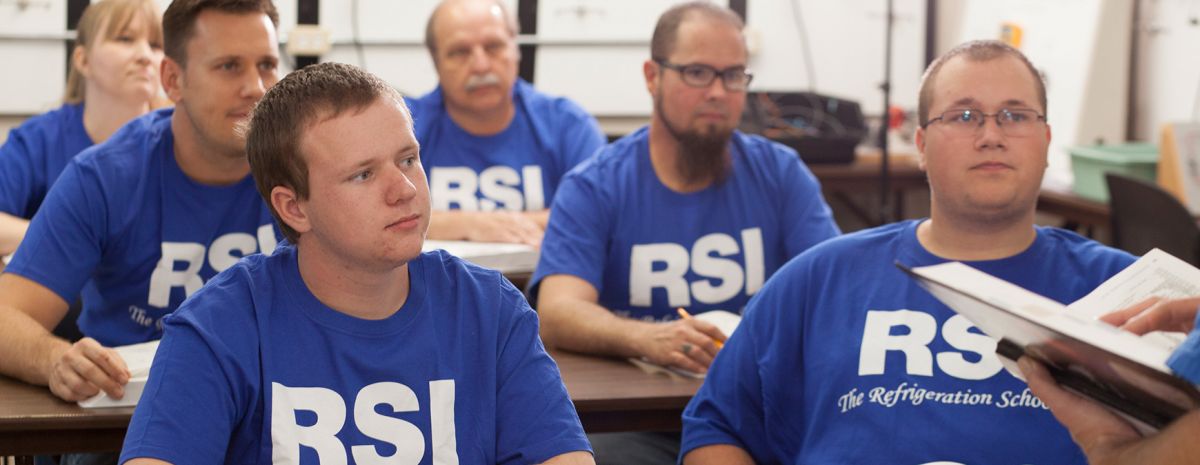RSI is a Great Training Option for Everyone
Learn more about how we can prepare you to advance your career.
In 2020 and coming years, HVAC training could be important because the equipment continues to become more technologically advanced, oftentimes requiring specialized training to service and repair. This is one reason why most employers these days prefer to hire workers with a formal HVAC education from a trade school.1
Keep reading to learn more about HVAC training and where it could take you this year and further into the future.
Why Becoming an HVAC Tech Could Be a Good Career Move
Before deciding on whether or not to pursue vocational training, it’s probably a good idea to answer the question, “Is HVAC service something you could see yourself doing?”
Let’s take a look in what this career path could offer…
Here are some reasons you might find a career in HVAC to be a good fit for you:
Get Started on the Path to a New Career
Fill out our form to learn how we can help you change your life.
- As of 2019, The Bureau of Labor Statistics (BLS) projected the job outlook for Heating, Air Conditioning, and Refrigeration Mechanics and Installers to be 4% though 2029, which is as fast as average for all occupations, according to the BLS.2*
- Varying job sites and environments can help reduce boredom and burnout. For example, your job sites might include residential homes, large and small businesses, factories, schools, hospitals and more.
- A wide variety of duties and tasks ranging from repairs to installations and maintenance—just to name a few.2
- Room for career advancement.3
- The 2019 median pay for HVAC mechanics and installers was $48,730 per year, or $23.43 per hour.2**
OK, that sounds great, but do I really need formal HVAC career training?
Why HVAC Training Can Be Helpful
HVAC training can be important because the equipment is becoming increasingly technologically advanced. That means complex heating, ventilation, air conditioning and refrigeration concepts are now being used versus the relatively basic methods of yesteryear.
Other reasons include improving opportunities to secure jobs because employers actively seek candidates who have technical training.1
Additionally, HVAC training could help meet the industry’s growing long-term need for qualified HVAC/R techs.4
What Are Some of the Top HVAC Technician Skills?
Certain equipment knowledge and skills can be especially handy in the field of HVAC service and repair:
- Package units
- Air conditioner units
- HVAC
- Boilers
- Preventive maintenance
- Air ducts
- Troubleshooting basic HVAC problems
- Furnaces
- Heat pumps
- Customer service5
Could I Learn All of This at an HVAC School?
HVAC schools can teach a lot of the technical skills needed for this career path. You’ll likely practice working on some of the equipment in the above list in an HVAC training program.
HVAC Training Subject Matter
Here are some of the subjects you could study in The Refrigeration School’s Refrigeration Technologies program:
- Fundamentals of refrigeration
- Fundamentals of electricity
- Advanced troubleshooting
- Comfort systems
- Refrigeration systems and practices
This is just a small sampling of what you might expect to learn at an HVAC training school.
However, the benefits of formal HVAC training don’t end there.
Benefits of HVAC School
Attending an HVAC school could be a much quicker process than training at a community college or through an apprenticeship. An HVAC school could take you about six months versus the multiple-year process required by a community college or an apprenticeship.1 This is important because you might be able to get started on your career more quickly.
Plus, an HVAC training school could offer part-time and flexible training schedule options, so regardless of your lifestyle, you can still work your way towards getting an HVAC diploma and a rewarding career.6
The assistance you could receive after you graduate can be just as valuable as the specialized training itself.
Keep reading…
HVAC School Graduate Services
Some HVAC training schools might assist you with transitioning into your new career by helping you prepare for and secure your first job. This can be especially important because, at this point, you may not have any previous work experience in the field.
RSI’s Career Services department can work with you on the following:
- Job searches
- Resume composition
- Cover letter writing
- Interview practice
- Employer and professional networking
- Job fairs
- Certification resources
What’s Next?
If you would like to pursue HVAC training, contact the RSI Admissions Department to learn more about the school’s programs.
As an RSI student, you could receive help with all of the abovementioned career training and preparation tasks, as well as information about local job fairs and other networking events. RSI works with both local, Arizona and nationwide employers to help graduates find job opportunities.
Are you ready to get started?
Let’s do this! Call 888-671-5803
Additional Sources
*According to BLS data Arizona employed 9,600 Heating, Air Conditioning, and Refrigeration Mechanics and Installers (499021) through May 2019 http://data.bls.gov/oes.
**Phoenix Area’s annual mean wage for Heating, Air Conditioning, and Refrigeration Mechanics and Installers (499021) reported by BLS as of May 2019 http://data.bls.gov/oes. Average starting salary for Refrigeration Technologies is $35,584 for RSI graduates employed during the 12 month period of 7/1/18-6/30/19.
1https://www.bls.gov/ooh/installation-maintenance-and-repair/heating-air-conditioning-and-refrigeration-mechanics-and-installers.htm#tab-4
2https://www.bls.gov/ooh/installation-maintenance-and-repair/heating-air-conditioning-and-refrigeration-mechanics-and-installers.htm
3https://explorethetrades.org/what-we-do/education/hvac/why-become-an-hvac-technician/
4https://www.bls.gov/ooh/installation-maintenance-and-repair/heating-air-conditioning-and-refrigeration-mechanics-and-installers.htm#tab-6
5https://www.zippia.com/hvac-technician-jobs/skills/
6https://www.rsi.edu
This blog has been labeled as archived as it may no longer contain the most up-to-date data. For a list of all current blog posts, please visit our blog homepage at https://www.rsi.edu/blog/




